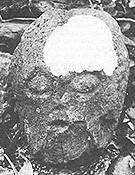Courtesy of Al Takrur

The Evolution of the Caucasoid
Journal of African Civilizations
November 1985 (vol.7, no.2)
New Brunswick,NJ: Transaction Publishers Rutgers — The State University, 1985
pp. 20-21, w/notes 41-44 p.311
The Sumerians were Black…
Rawlinson was convinced that there was a relationship between the Sumerians and Africans. As a result he used two African languages: one Semitic and the other Cushitic to decipher the cuneiform writing. Rawlinson was sure that the ancient Nubians and Puntites founded Mesopotamian civilization.(1)
“Get Kony” begins a Saga

Last week, there was a noise around the world following the making of a viral video about the much misunderstood, secretive and little known African warlord called Joseph Kony, and the Lord’s Resistance Army. It resulted in a curse heard around the world. The story follows below.
March 16, 2012
Crom Dubh of the Celts

Compare with Sierra Leonian Stone Sculpture
Black God of Ireland
There was the first god of Ireland, an Ethiopian Muur, by the name of Crom Dubh, whose cult came from Africa, who just couldn’t be church-washed nor white-washed easily, so he was supposedly suppressed, erased and buried. If only they could. Because the black god rises again and again like the true Phoenix.

(translation from Greek)
The Country of Black Greeks
Greece started as a land of contrasts, ie a state in the 18th and early 19th century, inhabited by many different tribes, each unique civilizations: Albanian populations in Epirus, the Ionian Greeks Romance, Jews in Thessalonica, Turks and Bulgarian speakers in Macedonia and so forth.

Detail of “Atahualpa, Fourteenth Inca, 1 of 14 Portraits of Inca Kings”
Atahualpa, the last Inca emperor, ruled over a vast terrain that stretched along the Pacific Ocean from Ecuador to Chile. After winning the crown in 1532 through a bitter civil war with his brother after their father’s death, he was ambushed and executed by the Spanish explorer Francisco Pizarro.
Wole Soyinka
Let me begin by reminding everyone that Boko Haram has a very long history, whether you describe Boko Haram as an army of the discontent, or even as some people grotesquely try to suggest, “revolutionaries,” or you describe them as, legitimately, this time, as marginalised or feeling marginalised.